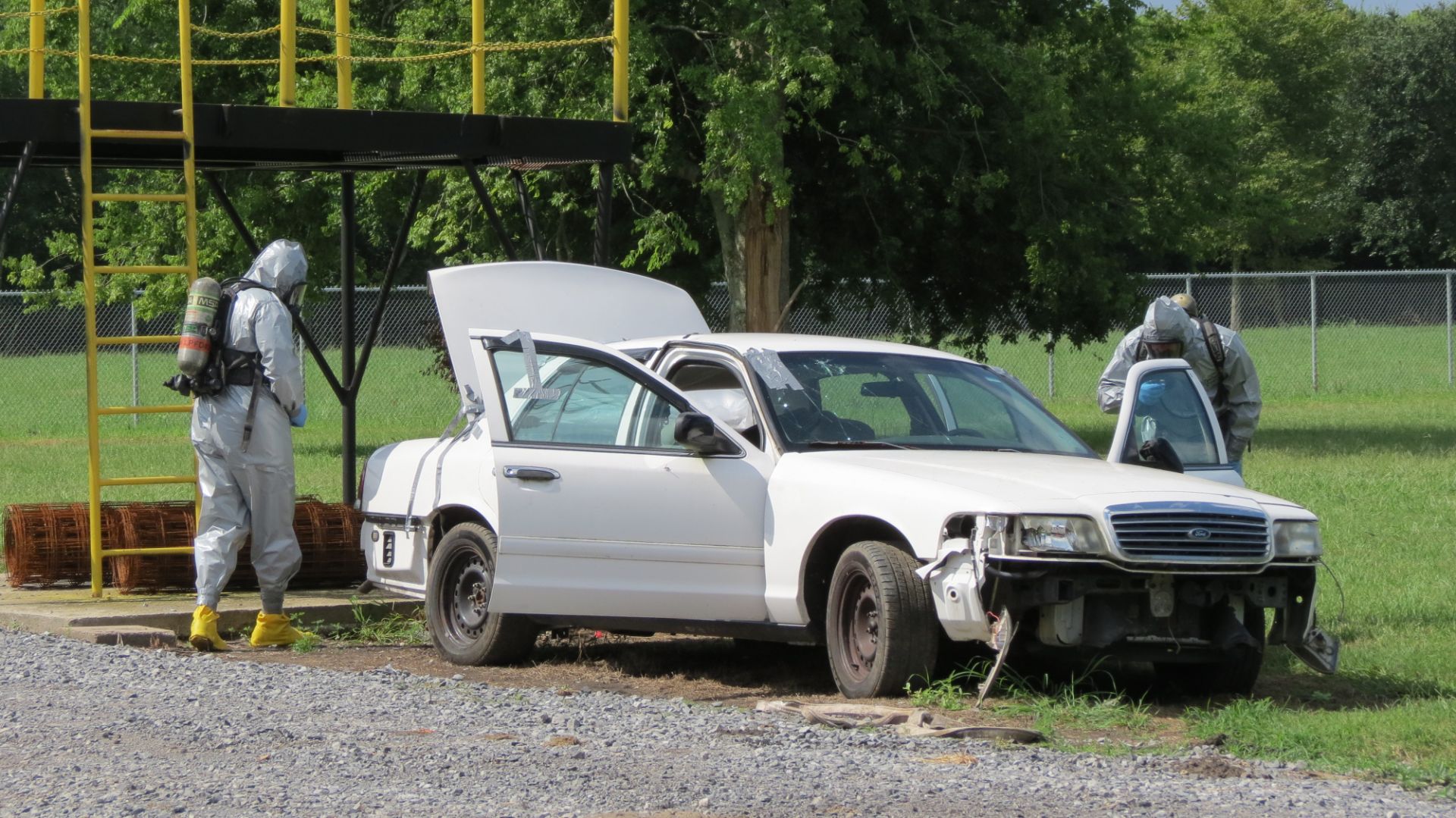
Grill-Off Challenge: Nicholls chefs vie for local title, Dansereau House job
August 14, 2014
Trooper brutality alleged: Baton Rouge man says he was hit while handcuffed
August 14, 2014More than 30 local policemen and firefighters are now better suited to recognize and process meth labs.
Members of the Lafourche Parish Sheriff’s Office, Terrebonne Parish Sheriff’s Office, Houma Police Department, Lafourche Fire District No. 3, Bourg Volunteer Fire Department and the Montegut Fire Department spent last week taking a 40-hour course, which included tests and hands-on training in the field.
MERIT, an acronym for Methamphetamine lab Recognition and Investigation Training, combines the skills of police and fire agencies to form an organized team in the event of a lab fire.
“Dealing with a crime scene is not normal parameters for a fire department, of course. Dealing with hazardous materials is not something for law enforcement. So by combining the whole discipline, you make a much more thorough and effective team,” said Fire District No. 3 assistant chief Kully Griffin. “On top of that by training all these people in what’s going on they’ll be naturally safer just by knowing all the information they’ve absorbed this week.”
MERIT owner, lead instructor and equipment designer Jake Kelton said too often fire department personnel respond to a fire they think is a structural fire, when in fact it’s a burning meth lab. The training aims to teach firefighters to recognize the telltale signs of a meth lab as soon as possible – preferably 30 seconds or less – and alert police.
“When they get down there, they’ll say, ‘I know those items. I know those pieces of the puzzle.’ And what they’re able to do is put the puzzle together, so when [police] are doing an investigation, a jurisdiction can understand that it is a crime scene,” Kelton said. “They need to go and recognize those things right away. If they can’t that means that the guys inside the location have been exposed [to chemicals] the whole time.”
Chemicals radiating from a burning meth lab can be very hazardous. That’s why response personnel should wear a full HAZMAT suit for protection. Because of the high heat responders can experience, emergency personnel are always on standby.
“They’re going to be in these plastic suits in 95 degrees for an hour and a half. Your heat index is well over 150 degrees inside the suits. Your body can’t cool off anymore. Once you’re in that suit you can’t perspire and evaporate and cool off anymore so all that stays in the suit,” Kelton said.
Officials said it usually takes between six and eight hours to process a meth lab, and response personnel take shifts processing the lab in full HAZMAT attire.
Lafourche Parish Sheriff’s Office Sgt. Adam Dufrene, who is a member of the agency’s drug task force, said this training shows the truer side to meth versus what television shows reflect.
“This will present the dangers and it gives the public the chance to see how much precaution and how much safety we have to use that is not used by the cooks themselves,” Dufrene said. “Caution is thrown to the wind.
“Cooks are just worried about the product. Nothing else.
“You’ll find that the cooks will discard most of the items in regular trash containers, regular garbage, put out to the side of the road to be picked up by garbage men,” Dufrene said. “This training will show the true precautions that need to be taken by all individuals by which the measures that aren’t taken by the cooks.”
Dufrene said the Lafourche sheriff’s office busts at least three or four meth labs per year, and the number of labs is on the upswing because the public is becoming more aware of what to look for in order to tip off police.
“It makes it easier for us. We need that public response to this,” he said.
And when a bust takes place, local personnel are now more ready than ever.
Kelton said Bayou Region responders went through very rigorous training last week. They all passed the 75-question fill-in-the-blank test with an average score of 95 percent, he said. Students must score an 85 percent to pass.
“The tests that they took were very difficult tests,” the MERIT owner said. “It wasn’t just circle A, B, C or D. You had to fill in the blanks and actually know the stuff because these people have to make good decisions out there in the field. If they don’t, they can end up killing somebody.”
MERIT, which has offices in Mississippi and Pennsylvania, has now trained nearly 1,000 people in Louisiana, and more than 7,000 total in 36 states.
“Honestly, [Louisiana] is probably one of the most proactive states I’ve trained in,” Kelton said. “It’s a state where fire and police have been working together for years.”
Kelton said that unity as a specialized team is not only the best way to respond to meth labs, but it also cuts costs to taxpayers because police agencies won’t need to buy a lot of the equipment fire departments already own.
“You’re saving the community tens of thousands of dollars, and at the same time safety is so much better because they’re working as a team,” he said.
Certification lasts for one year. Responders can be recertified after taking an eight-hour course, according to Kelton.
Local police and firefighters underwent extensive hands-on training last week in processing meth labs. Authorities said the increase in the number of illegal labs locally prompted the additional training.










